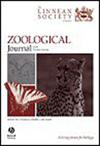Evolutionary and biogeographic patterns in the deep-sea echinoid families Pourtalesiidae Agassiz 1881 and Ceratophysidae fam. nov. (Echinoidea)
IF 3
2区 生物学
Q1 ZOOLOGY
引用次数: 0
Abstract
The sea urchin family Pourtalesiidae is primarily an abyssal taxon, exhibiting extremely modified morphologies that have emerged as an adaptation for burrowing in soft sediment. Here, we present the first detailed molecular phylogeny of the family Pourtalesiidae. Both morphological and molecular evidence support the establishment of the family Ceratophysidae fam. nov. to accommodate seven former pourtalesiid genera. The name Pourtalesiidae is retained for the group of genera Cystocrepis and Pourtalesia. Based on morphological data, the fossil genus Galeaster is transferred to the monotypic family Galeasteridae fam. nov.. Families Pourtalesiidae and Ceratophysidae are each characterized by a unique pattern of plastron plating. Reconstructions indicate that elongated tests, as well as other adaptations for burrowing, evolved independently in these families. The evolutionary histories of pourtalesiids and ceratophysids are complex and include several instances of increase and decrease in this specialization. Molecular data support the Antarctic origin of Pourtalesiidae and Ceratophysidae, although for the latter the support is limited. The initial dispersal of pourtalesiids from the Antarctic occurred in the northward direction and included distribution of the least specialized forms throughout the eastern Pacific. Broad radiation of the more specialized forms apparently occurred later. The biogeographic history of the family Ceratophysidae is more complex and at present cannot be reconstructed reliably.深海回声虫科 Pourtalesiidae Agassiz 1881 和 Ceratophysidae fam. nov. (Echinoidea) 的进化和生物地理模式
海胆科(Pourtalesiidae)主要属于深海类群,其形态极度变形,是为了适应在松软沉积物中穴居而出现的。在这里,我们首次详细介绍了海胆科的分子系统发育。形态学和分子证据都支持建立新的 Ceratophysidae 科,以容纳以前的七个 Pourtalesiid 属。Pourtalesiidae科的名称保留给Cystocrepis属和Pourtalesia属。根据形态学数据,化石属 Galeaster 被归入单型科 Galeasteridae fam. nov.栉水母科(Pourtalesiidae)和瓣鳃水母科(Ceratophysidae)各自以独特的底盘板纹为特征。重建结果表明,拉长的测试以及其他穴居适应性在这两个科中是独立进化的。栉水母类和栉水母类的进化历史非常复杂,包括这种特化现象的几次增加和减少。分子数据支持栉水母科(Pourtalesiidae)和瓣水母科(Ceratophysidae)起源于南极,但对后者的支持有限。南极栉水母最初是向北扩散的,包括在整个东太平洋分布的特化程度最低的形态。特化程度较高的种类显然是后来才广泛扩散的。Ceratophysidae 科的生物地理历史更为复杂,目前还无法可靠地重建。
本文章由计算机程序翻译,如有差异,请以英文原文为准。
求助全文
约1分钟内获得全文
求助全文
来源期刊
CiteScore
6.50
自引率
10.70%
发文量
116
审稿时长
6-12 weeks
期刊介绍:
The Zoological Journal of the Linnean Society publishes papers on systematic and evolutionary zoology and comparative, functional and other studies where relevant to these areas. Studies of extinct as well as living animals are included. Reviews are also published; these may be invited by the Editorial Board, but uninvited reviews may also be considered. The Zoological Journal also has a wide circulation amongst zoologists and although narrowly specialized papers are not excluded, potential authors should bear that readership in mind.

 求助内容:
求助内容: 应助结果提醒方式:
应助结果提醒方式:


